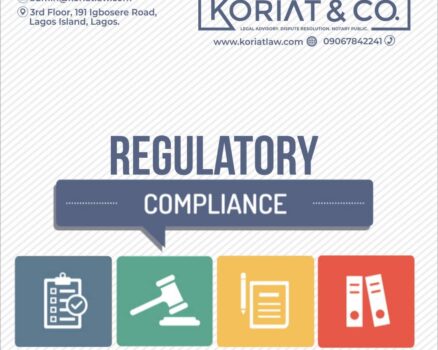
Micro-finance banks are fast growing credit companies in Nigeria with an edge of being deposit-taking institutions over and above the State-licensed money lending companies which are licensed only to lend money but not to process cash deposits from customers. According to the Nigerian Bureau of Statistics, Microfinance Banks in Nigeria recorded an 82% boost in lending rising from N300.2 billion in 2019 to N546.6 billion in 2020. Interestingly, loans by Microfinance banks surged to N1.12 trillion as of the end of June 2022, which means additional N602.8 billion new loans have been issued, representing a 115.7% increase compared to N521.25 billion recorded as of the end of 2021.
Categories of Microfinance Bank Licence in Nigeria
There are different categories of Micro-Finance Bank (“MFB”) licence in Nigeria with different share capital requirements. Below are the different categories:
- Tier 1 Unit MFB (with urban authorization), this MFB is licensed to operate in the banked and high-density areas, and is allowed to open not more than four (4) branches outside the head office within five (5) contiguous Local Government Areas as approved by the CBN. The Minimum Share Capital for this class of licence is N200,000,000 (Two Hundred Million Naira).
- Tier 2 Unit MFB (with rural authorization), this MFB is licensed to operate only in rural, unbanked or underbanked areas, and is allowed to open one (1) branch outside the head office within the same Local Government Area. A Tier 2 Unit MFB requires a N50,000,000 (Fifty Million Naira) Minimum Share Capital.
- State MFB, this MFB is licensed to operate in either a State or the Federal Capital Territory (FCT) Abuja and is allowed to open branches within the same State or the FCT, where it is licensed. Please note that a State MFB is required to obtain CBN’s approval before opening each new branch or cash centre and it is not permitted to open more than two branches or cash centres in the same Local Government Area unless it has established at least one (1) branch or cash centre in every Local Government Area in the State or the FCT (as the case may be). Please note also that a newly licensed State MFB shall not commence operations with more than ten (10) branches. A State MFB requires a N1,000,000,000 (One Billion Naira) Minimum Share Capital Company.
- National MFB: This MFB is authorized to operate in more than one State including the FCT. A newly licensed National MFB shall not commence operations with more than ten (10) branches. A National MFB requires a N5,000,000,000 (Five Billion Naira) Minimum Share Capital Company.
Scope of Permissible & Non-Permissible Business Activities
- Permissible Business Activities of MFBs
An MFB shall be allowed to engage in the following services to customers:
- Acceptance of various types of deposits including savings, time, target and demand deposits from individuals, groups and association;
- Provision of credit to its customers
- Provision of housing micro loans
- Provision of ancillary services such as capacity building on record keeping and small business management and safe custody
- Issuance of debentures to interested parties to raise funds from members of the public with the prior approval of the CBN;
- Collection of money or proceeds of banking instruments on behalf of its customers including clearing of cheques through correspondent banks;
- Act as agent for the provision of mobile banking, microinsurance and any other services as may be determined by the CBN from time to time, within the geographic coverage of its licence;
- Appoint agents to provide financial services on its behalf in line with the CBN Agent Banking Guidelines, within the geographic coverage of its licence;
- Provision of payment services such as salary, gratuity, pension for employees of the various tiers of government;
- Provision of loan disbursement services for the delivery of the credit programme of government, agencies, groups and individual for poverty alleviation on non-recourse basis;
- Provision of banking services to its customers such as domestic remittance of funds;
- Maintenance and operation of various types of account with other banks in Nigeria;
- Investment of its surplus funds in suitable money market instruments approved by the CBN;
- Operation of micro leasing facilities, microfinance related hire purchase and arrangement of consortium lending;
- Participate in CBN Intervention Fund and funds other sources;
- Provision of microfinance related guarantees for its customers;
- Financing agricultural inputs, livestock, machinery and industrial raw materials to low- income persons;
- Investment in cottage industries and income generating projects for low-income persons as may be prescribed by the CBN from time to time;
- Provision of professional advice to low-income persons regarding investments in small businesses;
- Issuance of domestic commercial paper subject to the approval of the CBN;
- Provide financial and technical assistance and training to microenterprises; and
- Any other permissible activity as may be approved by the CBN from time to time.
2. Non-Permissible Business Activities:
MFBs are prohibited from engaging in the following financial services:
- Foreign currency transactions, except foreign currency borrowings;
- International commercial papers;
- International corporate finance;
- International electronic funds transfer;
- Clearing house activities;
- Collection of third-party cheques and other instruments for the purpose of clearing through correspondent banks;
- Dealing in land for speculative purposes;
- Dealing in real estate except for its use as office accommodation;
- Provision of any facility for speculative purposes;
- Leasing, renting, and sale/purchase of assets of any kind with related parties and/or significant shareholders (five per cent or more of the equity) of the MFB, without the prior written approval of the CBN;
- Financing of any illegal activities; and
- any activity other than those permitted as stated above or as may be prescribed by the Central Bank of Nigeria from time to time.
Requirements and Procedure for a Micro Finance Bank Licence
In Nigeria, the MFB licensing process is in two (2) stages, namely:
- Approval-in-Principle stage; and
- Final License stage
- Approval-In-Principle Stage
Promoters and investors are required to reserve the name of their proposed MFB with the Corporate Affairs Commission (“CAC”) before proceeding to submit their application to the CBN for an Approval-In-Principle (“AIP”).
Promoters may be required to make a pre-licensing presentation to the CBN upon submission of their application. This presentation revolves around the business plan and the identity of the promoters as well as the equity contributors and source for funds.
The requirements for AIP are as follows:
- A formal application for the grant of AIP addressed to the Governor of the Central Bank of Nigeria.
- The application shall be supported by the following:
- Evidence of payment of non-refundable application fee to the Central Bank of Nigeria;
- Evidence of capital contribution made by each shareholder;
- Evidence of minimum capital deposit (which is equivalent of the applicable share capital for the category of licence for which the promoters are applying);
- Evidence of name reservation with the CAC;
- Detailed business plan or feasibility report which shall, at a minimum, include:
- Objectives of the Microfinance Bank;
- Justification for the application;
- Ownership structure in a tabular form indicating the name of proposed investor(s), profession/business and percentage shareholdings;
- Sources of funding of the proposed equity contribution for each investor;
- Where the source of funding the equity contribution is a loan, such shall be a long-term facility of at least 7-year tenor and shall not be taken from the Nigerian banking system;
- Organizational structure, showing functional units, responsibilities, reporting relationships and grade of heads of departments/units;
- Schedule of services or products to be offered;
- Five-year financial projection of the proposed bank indicating expected growth, profitability and the underlying assumptions; and
- Details of information technology requirements and facilities.
- For institutional investors, promoters shall forward the following additional documents:
- Certificate of Incorporation and certified true copies of other incorporation documents.
- Board resolution supporting the company’s decision to invest in the equity shares of the proposed bank;
- Names and addresses (business and residential) of owners, directors and their related companies, if any;
- Audited financial statements & reports of the company and Tax Clearance Certificate for the immediate past 3 years.
- Draft copy of the company’s Memorandum and Articles of Association (MEMART) of the MFB. At a minimum, the MEMART shall contain the following information:
- Proposed name of the MFB (Objects clause, Subscribers to the MEMART, Procedure for amendment, Procedure for share transfer/disposal and Appointment of directors).
- A written and duly executed undertaking by the promoters that the MFB will be adequately capitalized for the volume and character of its business at all times;
- For regulated foreign institutional investors, an approval or a ‘no objection letter’ from the regulatory authority in the country of domicile;
- Shareholders’ agreement providing terms for disposal/transfer of shares as well as authorization, amendments, waivers, reimbursement of expenses;
- Statement of intent to invest in the bank by each investor;
- Technical Services Agreement, where applicable;
- Detailed Manuals and Policies covering:
- Credit Policy Manual;
- Internal Audit Manual;
- Asset/Liability Management Policy (ALM Policy);
- Accounting policies and principles;
- Roles and responsibilities of the senior management officials responsible for financial management
- Treasury operations, including funds management, vouchers, payroll and procurement;
- Anti-Money Laundering and Combating Financing of Terrorism (AML/CFT) Policy;
- Enterprise-Wide Risk Management Framework;
- Whistle Blowing Policy;
- Code of Ethics and Business Conduct.
- Bank Verification Number (BVN) and Tax Clearance Certificate of each member of the Board and significant shareholders.
- Duly signed resume and valid means of identification for proposed shareholders of the MFB.
- Criteria for selecting board members;
- Board composition, directors’ duly signed resumes and valid means of identification. The size and composition of the board shall comply with the provision of the CBN Code of Corporate Governance for MFBs
- Consolidated statement of account showing the capital contribution for all shareholders;
- Completed Fitness and Propriety Questionnaire; and sworn declaration of net worth executed by the proposed shareholders, directors and management personnel;
- Any other information or document that the CBN may require from the promoters.
Please note that the minimum and maximum number of Directors on the boards of MFBs shall be five (5) and seven (7) for Unit MFBs; five (5) and nine (9) for State MFBs; and seven (7) and twelve (12) for National MFBs respectively.
Please note also that at least two (2) members of the Board of Directors other than the Executive Directors shall be required to have banking or related financial industry experience.
After a review of the application and the interview of the promoters, the CBN may grant an AIP to enable the promoters to complete the incorporation of the MFB and set up of the operational office.
Upon obtaining an AIP, registration with the National Association of Microfinance Banks (“NAMB”) becomes mandatory.
2. Final Licence Stage
Upon grant of the AIP, the MFB’s incorporation will be completed at the CAC.
Thereafter, an Application for Final Licence will be made to the CBN subject to presentation of the following:
- Evidence
of payment of non-refundable licensing fee to the CBN;
- Certified
true copy (CTC) of Certificate of Incorporation of the MFB;
- CTC of MEMART;
- CTC of CAC Application Form for Registration of the MFB;
- Evidence of location of Head Office (rented or owned) for the take-off of the business;
- Schedule of changes, if any, in the Board, Management and Shareholding after the grant of AIP;
- Evidence of ability to meet technical requirements and modern infrastructural facilities such as office equipment, computers, telecommunications, to perform the bank’s operations and meet CBN and other regulatory requirements;
- Copies of letters of offer and acceptance of employment in respect of the management team;
- List of proposed top management staff and duly signed resume stating their qualification (including photocopies of academic and professional credentials), experience, records of accomplishments and valid means of identification;
- Comprehensive plan on the commencement of the bank’s operations with milestones and timelines for roll-out of key payment channels;
- Board and staff training programme.
- Insurance of the MFB’s deposit liabilities with Nigeria Deposit Insurance Corporation (“NDIC”);
- Certified
true copy (CTC) of Certificate of Incorporation of the MFB;
As a requirement for the grant of final licence, the CBN may conduct an inspection of the premises and facilities of the proposed MFB.
If the CBN is satisfied with the Application for Final Licence, the CBN may grant Final Licence to the MFB.
Applicable Costs and Professional Fees
The applicable expenses for the company incorporation and licensing for each category of licence are estimated as follows:
| Particulars | TIER 1 UNIT | TIER 2 UNIT | STATE | NATIONAL |
| CAC Registration Cost | N2,510,000 | N640,000 | N12,525,000 | N62,515,000 |
| Application Fees | N100,000 | N100,000 | N200,000 | N300,000 |
| Licensing Fees | N250,000 | N250,000 | N500,000 | N1,000,000 |
| Cost of Registration with NAMB | N200,000 | N200,000 | N270,000 | N620,000 |
| Estimated Cost of product formation, documentation, facilitation and miscellaneous expenses | Ranges between 20,000,000 to 30,000,000 | Ranges between 20,000,000 to 30,000,000 | Ranges between 70,000,000 to 100,000,000 | Ranges between N100,000,000 to N150,000,000 |
| Professional Fees | Available on request | Available on request | Available on request | Available on request |
| Total Estimated Cost |
Also note that the shareholders are required to deposit the Minimum Share Capital with the CBN at the time of submission of Application for AIP. This sum may or may not be invested by CBN but is refundable (with or without interest) at the completion of the process.
Estimated Timelines
The estimated timeline for grant of an AIP is between 3 to 6 months after submission of Application.
Also, the estimated timeline for the grant of Final Licence is between 3 to 6 months after submission of Application for Final Licence.




